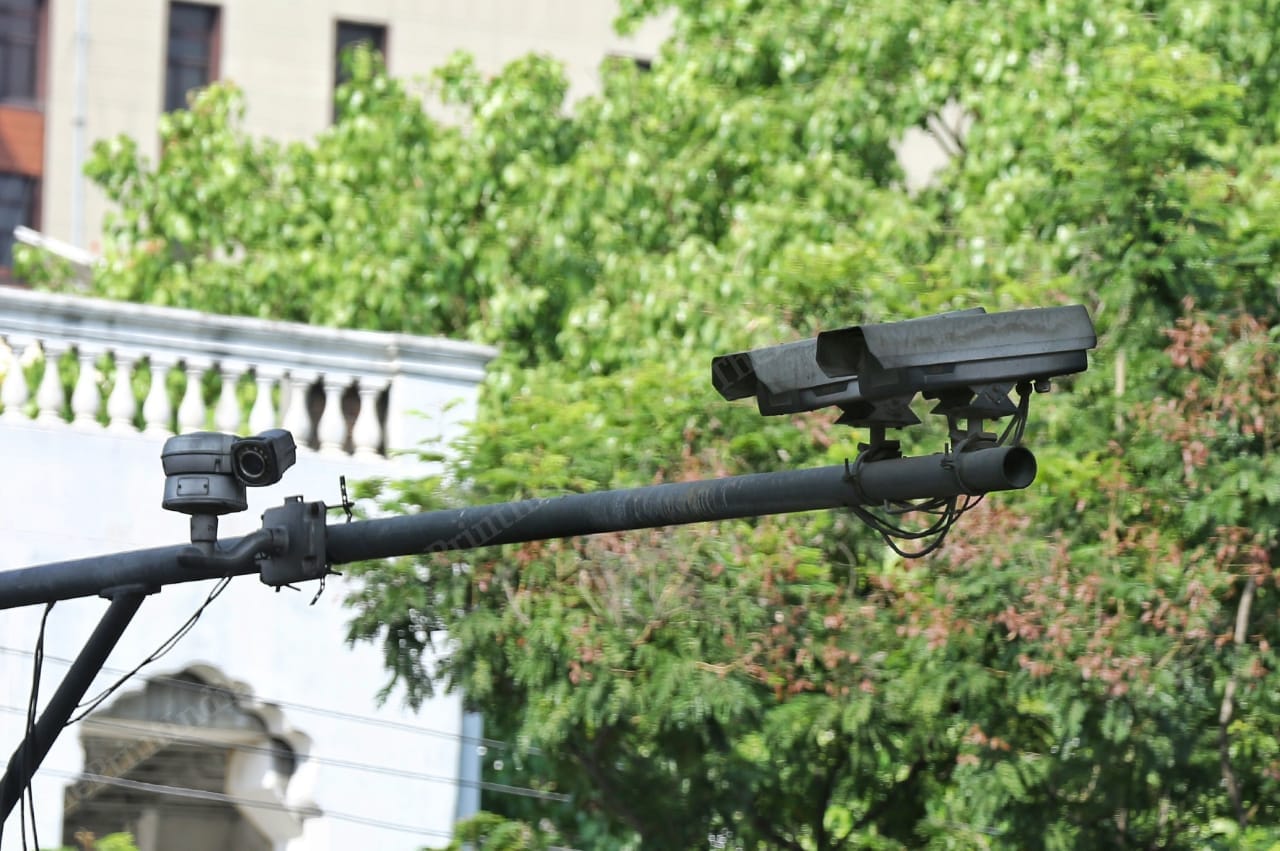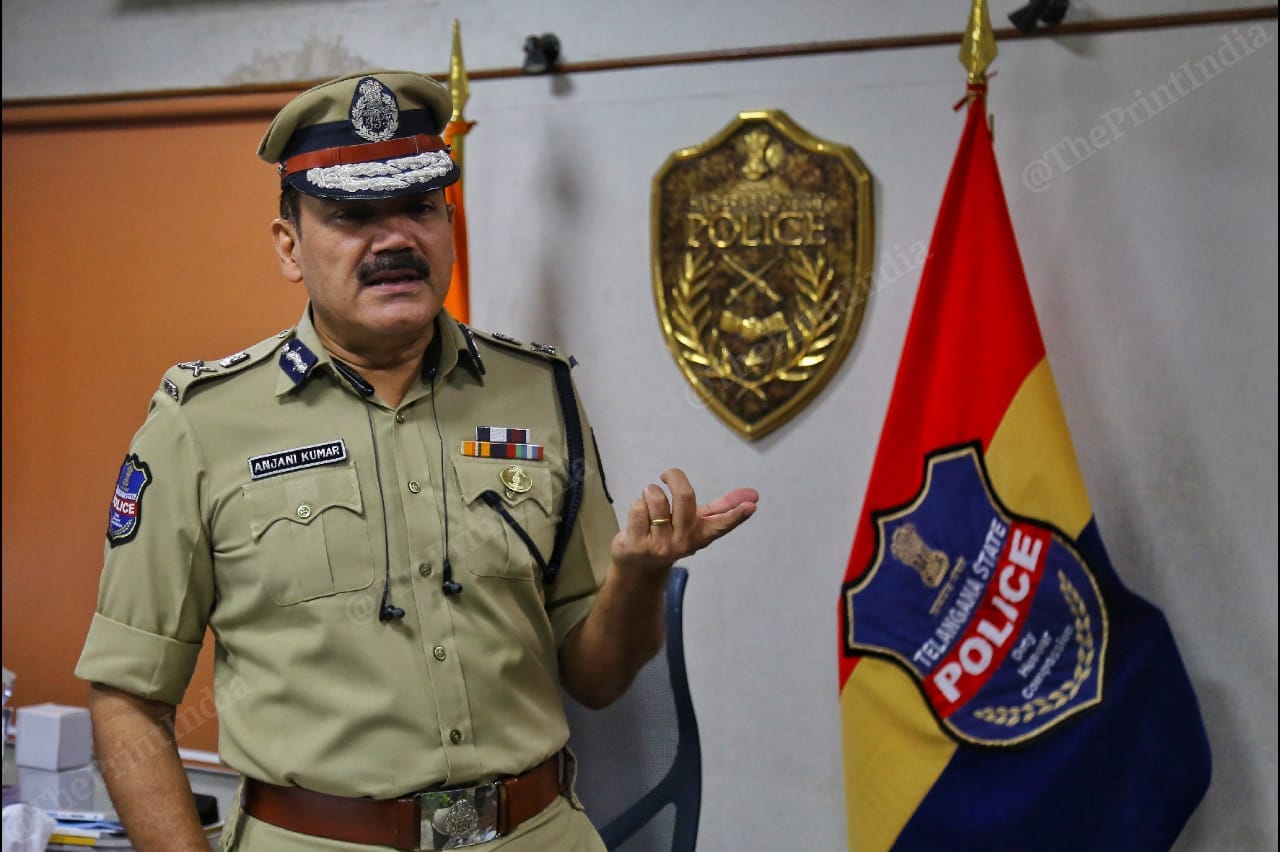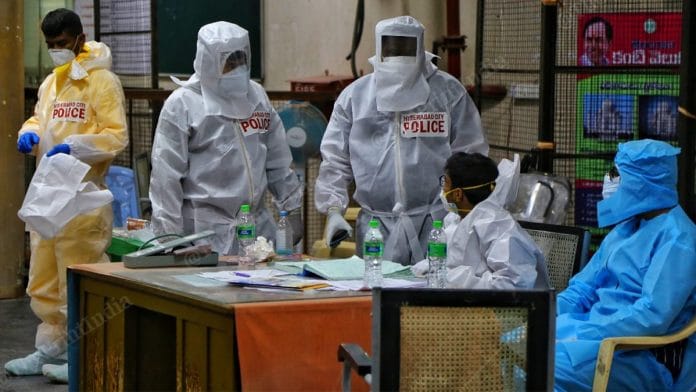Hyderabad: From a CCTV camera-based system and geo-mapping to facial recognition technology, the Telangana Police is relying heavily on Artificial Intelligence (AI) to ensure those out on the streets are wearing masks and adhering to social distancing and other norms to arrest the spread of Covid-19.
As Telangana continues to court controversy for its low testing numbers, one of the TRS-led government’s defence has been that it has effectively controlled the spread of the infection due to timely containment and contact-tracing.
And the institution that the government has credited for its “successful containment” has been the Telangana Police. While in the early days of the Covid-19 crisis, the police was tasked with ensuring the lockdown, the personnel are now busy keeping an eye on those violating the safety and distance guidelines.
On 8 May, the Telangana Police rolled out its AI-based system that helped it track, through CCTV cameras and facial recognition technology, those not wearing masks.
On 27 May, the police launched ‘Physical Distancing Index’ project in Hyderabad, Cyberabad and Rachakonda. This too uses technology to prevent crowding amid the lockdown.
Speaking to ThePrint, police officers said those not wearing masks are identified and then taken to court after a “petty case” is filed online. “After registering an FIR, the police charges violators under Clause b of Section 51 of the Disaster Management Act. We then file a chargesheet enclosing a photograph of the person/violator,” said a senior police officer, adding that it is up to the court to impose a fine.
The police have strictly enforced the mask norms. According to Telangana government data, between 8 May and 31 May, as many as 45,390 cases were registered. Of these, 33,865 cases were filed across the districts of Telangana and another 11,525 across the three commissionerates of Hyderabad (8,242), Cyberabad (1,571) and Rachakonda (1,712).
The policy, however, has not been without controversy, with critics alleging that the police are violating privacy norms and illegally employing facial recognition technology.
Also read: We know how to protect our people, accusation of low testing wrong: Telangana health minister
Monitoring social distancing through cameras
As for its ‘Physical Distancing Index’ project in Hyderabad, Cyberabad and Rachakonda, the Telangana Police relies heavily on CCTV cameras in these areas.
The state has over 10 lakh CCTV cameras, which include government-run ones, the community cameras (streets) and the “nenu saitham” cameras that are placed outside gated communities and apartments.
In the Hyderabad region, the police central command room has access to 20,000 such cameras enabling it to survey around 250 junctions in the three areas. The state has been using these cameras for surveillance as part of an ongoing pilot project for digitsation, geo-tagging and verification of criminals by the Ministry of Home Affairs.
Video footage is sent to the police command centre in real time and an analytics software identifies those violating the norms. While the main control room building is currently under construction in Banjara Hills locality, it temporarily operates out of the office of the commissioner of Hyderabad Police.
Describing it as a “first-of-its-kind initiative” in the country, DGP M. Mahendar Reddy took to Twitter to disclose the project.
#AI based #FaceMaskViolationEnforcement is being rolled out by TS police.
Leveraging ComputerVision & #DeepLearningTechnique being implemented on surveillance CCTVs across the cities is #FirstOfItsKind in INDIA.
Shall be enabled shortly across the 3Commissionerates
*Hyd,Cyb&Rck. pic.twitter.com/hGwvq9cvsE
— DGP TELANGANA POLICE (@TelanganaDGP) May 8, 2020
At the control room, images flash on screens with ‘red borders’ encircling those violating the rules, said an officer. The visuals alert the police in real time, and the patrolling teams are then immediately informed about the violations.
Srinath Reddy, DSP (IT Cell), however, explained that the police’s intention is not to target people but spread awareness. “We want to create a culture where people realise this is a lifestyle change that they need to adopt for their own good.”
A similar system to track violators of traffic rules within a radius of 3 km around check posts has been in place in the state. It was used to trace violators in the first three phases of the lockdown. “Now, we have withdrawn this, as the CM has allowed some relaxations for movement of vehicles,” said a senior police officer.

Tracking containment zones, tracing contacts
The state’s health ministry collaborated with Hyderabad-based startup Vera Healthcare for monitoring of the containment zones.
Speaking to ThePrint, health officials said this helped them track foreign travellers who were “hiding their history”.
During the second phase of the lockdown, a traveller tracking system was introduced at the Secunderabd railway station to record travel history, symptoms and contacts of passengers, Hyderabad Police Commissioner Anjani Kumar told ThePrint. The details gathered were shared among officials of the district administration and police officers for monitoring of the passengers who were put under quarantine after travel, he said.

Call records and mobile locations were also tracked to trace primary, secondary and tertiary-level contacts of confirmed Covid cases. The government made use of geolocation technology or geo-mapping to track those under home quarantine, using the monitoring system.
The police recently introduced a house quarantine application in its TSCOP app to keep a tab on those who were quarantined after returning from abroad.
The police said TSCOP also helped them geotag houses with foreign travel history.
“We had to make use of technology, especially after the (Nizamuddin) markaz episode came to light. Besides the large number of Tablighi Jamaat members, their families and other contacts also had to be quarantined through the TSCOP app,” Anjini Kumar said.
The Telangana Police also deployed constables in PPE kits inside Covid-19 wards at the Gandhi Hospital, the key Covid care centre here, after a case of assault on a doctor came to light.
Privacy concerns
The Telangana Police’s methods, however, have stoked privacy concerns.
Srinivas Kodali, an interdisciplinary researcher working on technology, data and governance, strongly believes that the Telangana Police’s facial recognition efforts are illegal.
“The Supreme Court judgment on surveillance clearly states that no form of surveillance can be carried out without a law,” Kodali told ThePrint. “If the police want to use facial recognition or other forms of recognition, they still need to get a separate law and can’t issue statements claiming they are doing it under some other Act.”
Kodali, who has done extensive research on the state police’s projects, maintains that the Hyderabad Police maintains “a 360 degree profile” of all residents with a database called the Integrated Information Hub (IIH).
Devdutta Mukhopadhyay, associate counsel with the Internet Freedom Foundation, said the use of face recognition technology to identify individuals who are not wearing masks or adhering to physical distancing guidelines “is completely illegal”.
“While other countries are enacting special legislation to regulate or halt use of facial recognition technology, we are scaling up its use without even a general data protection law in place. Facial features are a form of sensitive biometric data and their misuse could be especially harmful because it is an immutable part of a person’s identity. Moreover, there is no clarity about the technical specifications or error rates of these systems,” she said.
Mukhopadhyay added that when the Telangana State Election Commission previously used facial recognition for voter authentication during municipal elections, they reported an accuracy rate of 78 per cent. “The error rate in the present case is likely to be much higher because…in case of matching through CCTVs, you cannot control angle, lighting, distance etc.”
DSP Reddy, however, denied the allegations about facial recognition. “The technology we use does not recognise the person. It only identifies those not wearing masks and cannot be classified as a facial recognition software,” he said.
Also read: Worst yet to come, Centre will realise nothing’s left for poor as economy reopens: Owaisi






